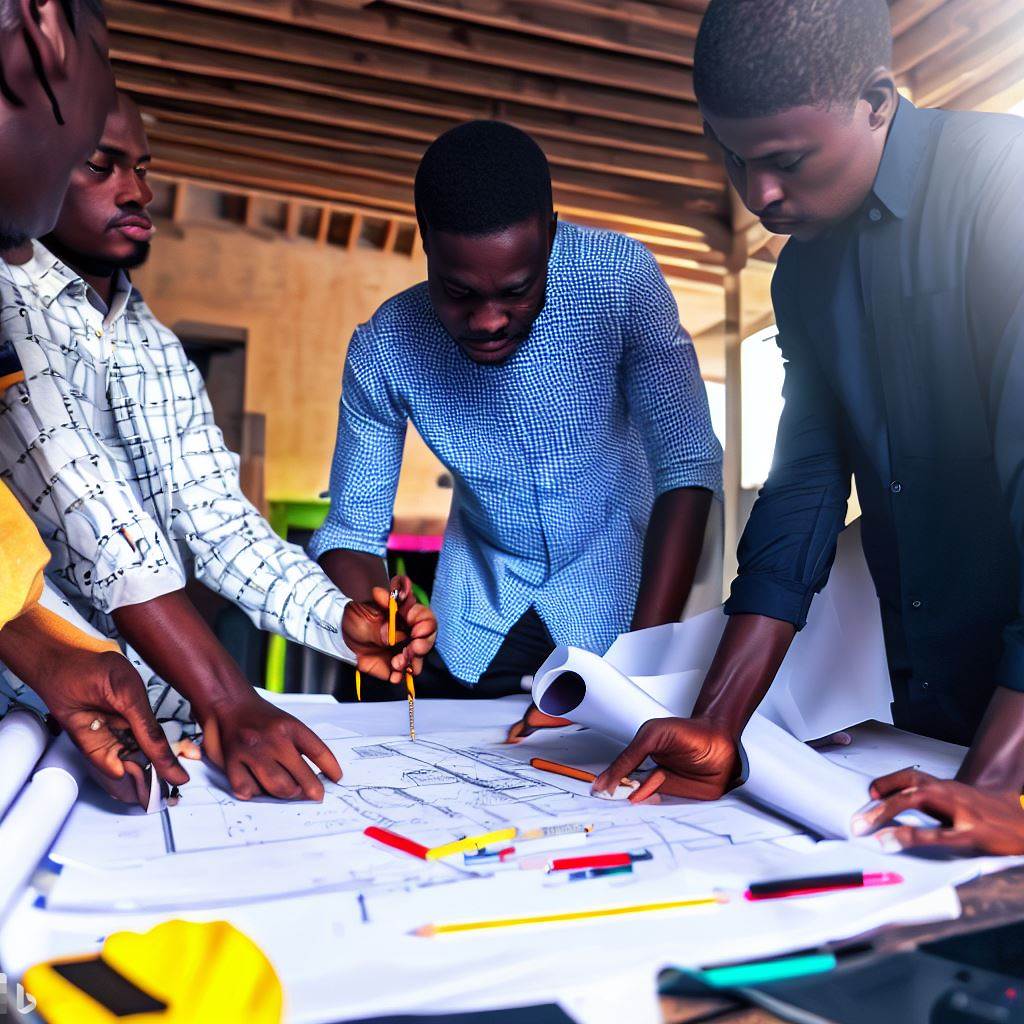Introduction
Defining Collaboration in Design
Collaboration in design is the dynamic process of professionals pooling skills to create unified solutions.
Significance of Collaborating with Architects in Nigeria
- Cultural Fusion: Architects blend local traditions with contemporary design, enriching cultural narratives.
- Innovation Spark: Collaboration ignites fresh ideas, propelling architectural innovation to new heights.
- Functional Expertise: Architects offer spatial insights, optimizing functionality for Nigeria’s unique contexts.
- Sustainability Synergy: Joint efforts tackle eco-challenges, integrating sustainable practices for a greener future.
- Community Integration: Collaboration ensures designs resonate with local communities, fostering a sense of belonging.
- Skill Enrichment: Professionals share expertise, nurturing growth in both designers and architects.
- Economic Growth: Combined talents attract investments, stimulating construction and driving economic development.
- Holistic Solutions: Collaborative projects result in holistic designs that address societal, aesthetic, and functional needs.
Intricate collaboration between designers and architects in Nigeria holds the key to transformative and culturally resonant architectural marvels.
The role of architects in Nigeria
The importance of architects in the design industry
- Architects play a crucial role in the design industry in Nigeria, bringing creativity and innovation to projects.
- They are responsible for creating functional, aesthetic, and sustainable designs that meet the needs of clients.
- Architects collaborate with clients to understand their vision and translate it into architectural plans.
- They possess the technical expertise to ensure that designs comply with building codes and regulations.
- Architects also consider environmental factors, such as climate and site conditions, in their design process.
- Their involvement in the design industry contributes to the economic growth of Nigeria by providing employment opportunities.
- Architects contribute to the beautification of cities and towns through the implementation of well-designed structures.
- Their designs create spaces that promote productivity, enhance quality of life, and foster positive user experiences.
The unique challenges faced by architects in Nigeria
- Limited awareness: Many clients in Nigeria are unaware of the value that architects can bring to their projects, leading to underutilization of their services.
- Lack of government support: The government’s recognition and support for the architectural profession in Nigeria is inadequate, hindering its growth and development.
- Inadequate infrastructure: Poor infrastructure, such as inadequate transportation and power supply, can impede architects’ ability to deliver their designs effectively.
- Corruption and bureaucracy: Architects often encounter corruption and bureaucratic hurdles during the project approval process, delaying project timelines.
- Limited access to resources: Architects in Nigeria may face challenges in accessing the necessary resources, such as materials and technology, for their projects.
- Market competition: The architectural industry in Nigeria is highly competitive, making it challenging for architects to differentiate themselves and secure projects.
- Lack of standardized fees: The absence of standardized fee structures can lead to disputes and undervaluation of architects’ services.
- Socio-cultural constraints: Architects in Nigeria must navigate socio-cultural constraints, considering local traditions and preferences in their designs.
- Security concerns: Architects may encounter security challenges in certain regions of Nigeria, impacting their ability to work on projects.
Overall, architects play a vital role in the design industry in Nigeria. They bring innovation, creativity, and sustainability to projects, contributing to economic growth and an improved quality of life.
However, they face unique challenges such as limited awareness, a lack of support, and inadequate infrastructure.
Overcoming these obstacles will be crucial for architects and the industry to thrive in Nigeria’s evolving design landscape.
Read: The Future of the Interior Design Profession in Nigeria
Benefits of collaboration in design
Explore how collaboration can enhance the design process
Design collaboration, especially with architects, elevates project quality and efficacy through these advantages:
- Diverse expertise enhances understanding and goals.
- Leveraging specialized skills yields comprehensive designs.
- Combining aesthetics, functionality, and planning.
- Innovation thrives in shared brainstorming.
- Feedback refines designs iteratively.
- Architects foresee challenges with codes and regulations.
- Effective communication bridges terminology gaps.
- Holistic designs incorporate context, sustainability, and cultural relevance.
- Architects facilitate connections with contractors and suppliers.
- Streamlined project management ensures design execution.
- Clients benefit from architects’ budgeting and feasibility insights.
- Architects ensure adherence to standards and codes.
- Collaboration elevates project quality, client satisfaction, and public welfare.
Successful examples of collaboration in Nigeria
Present case studies of successful collaborations between designers and architects
- Collaboration between Studio Stoone and Akindele Oluwatobiloba Architects resulted in the award-winning Kuggeh Aiyetoro project.
- The partnership between Larchitects and Spacefinish led to the remarkable transformation of a commercial space into a vibrant coworking environment.
- Designers from NLÉ Works collaborated with Kunle Adeyemi Architects to create the acclaimed Makoko Floating School.
Discuss the positive outcomes and impact of these collaborations
- Enhanced Creativity: These collaborations have pushed the boundaries of design and architecture, resulting in innovative and striking structures.
- Holistic Design Approach: By joining forces, designers and architects bring complementary skills and perspectives, leading to more holistic design solutions.
- Efficient Problem Solving: Collaborations offer an avenue for tackling complex design challenges by combining expertise and experiences.
- Social and Environmental Impact: Successful collaborations have created sustainable and socially responsible designs that positively impact communities.
- Public Recognition: The achievements of these collaborations have garnered national and international recognition, boosting Nigeria’s design reputation.
- Economic Growth: Collaborations between designers and architects bring economic benefits by attracting investment and creating employment opportunities.
- Knowledge Sharing and Learning: Each collaboration provides a platform for exchanging ideas, skills, and knowledge, fostering professional growth.
- Collaboration as a Catalyst: Successful examples of collaboration inspire future partnerships, fueling a culture of cooperation within Nigeria’s design industry.
- Increased Project Scope: Working together, designers and architects tackle projects that individually would be unfeasible, expanding the dimensions of design.
- Improved Project Efficiency: Collaboration streamlines design processes, enhancing project efficiency and reducing costs.
Case studies exemplify Nigerian design collaboration’s transformative impact:
- Joint efforts yield architectural feats reshaping Nigeria’s urban landscape.
- Collaboration fuels creativity, challenging norms, captivating the public.
- Diverse fusion addresses aesthetics, societal needs, fosters comprehensive design.
- Successful teamwork fosters growth, societal change, and environmental stewardship.
- Recognition bolsters global position, attracts investments, and fosters economic prosperity.
- Partnerships foster knowledge exchange, innovation, and continuous improvement.
- Success stories showcase design’s transformative potential.
- Teamwork shapes remarkable structures, a brighter future for communities, and the industry.
Read: The Future of the Interior Design Profession in Nigeria

Tips for effective collaboration with architects in Nigeria
Identify key factors to consider when collaborating with architects in Nigeria.
- Establish clear goals and expectations for the collaboration.
- Respect the architect’s expertise and professional knowledge.
- Understand the cultural and social context of Nigeria to ensure effective collaboration.
- Consider the local regulations, building codes, and materials availability in Nigeria.
- Ensure a mutual understanding of the project scope, timeline, and budget.
- Establish open and regular communication channels.
Provide strategies for effective communication and collaboration.
- Establish face-to-face meetings to build rapport and trust with the architect.
- Use clear and concise language to convey ideas and expectations.
- Utilize visual aids, such as sketches or drawings, to enhance communication.
- Invest in technology tools that facilitate virtual collaboration, such as video conferencing.
- Encourage active listening to ensure effective understanding and avoid misunderstandings.
- Foster a collaborative environment where all stakeholders can freely share ideas and concerns.
- Regularly update each other on project progress, challenges, and changes in plans.
- Identify and address conflicts promptly to maintain a harmonious collaboration.
- Establish a system for documenting decisions, changes, and agreements made during the collaboration.
- Celebrate milestones and achievements together to foster a positive working relationship.
Successful collaboration with Nigerian architects hinges on key considerations.
Here’s a guide for effective partnership:
- Define clear goals and expectations.
- Respect architects’ expertise.
- Understand cultural context.
- Consider local regulations and materials.
- Establish mutual project understanding.
- Foster rapport through face-to-face meetings.
- Use clear language and visual aids.
- Utilize technology for virtual collaboration.
- Practice active listening.
- Create a collaborative environment.
- Provide regular updates for transparency.
- Address conflicts constructively.
- Document decisions for clarity.
- Celebrate milestones for motivation.
By following these strategies, you can navigate collaborations smoothly and achieve successful design outcomes with Nigerian architects.
Read: Top Nigerian Mixing Engineers and Their Iconic Works
Addressing challenges in collaboration
Explore common challenges faced during collaboration with architects in Nigeria
- Language barrier: Clear communication can be hindered by language differences.
- Cultural differences: Differing cultural perspectives may lead to misunderstandings or conflicting ideas.
- Lack of trust: Building trust can be challenging, especially in new collaborations.
- Power dynamics: Unequal power dynamics can affect decision-making and collaboration processes.
- Logistical challenges: Limited resources and infrastructure can pose practical obstacles to collaboration.
Suggest solutions for overcoming these challenges and fostering successful collaborations.
- Language support: Providing translators or language assistance can improve communication.
- Cultural sensitivity: Promoting cultural awareness and respect can bridge gaps in understanding.
- Building relationships: Investing time and effort in building trust can strengthen collaborations.
- Empowerment and inclusivity: Fostering equal participation and decision-making can address power imbalances.
- Infrastructure development: Working towards improving resources and infrastructure can enhance collaboration.
Collaboration with architects in Nigeria can present both exciting opportunities and significant challenges.
Understanding and addressing these challenges is crucial for fostering successful collaborations in design projects.
In this section, we will explore some common challenges faced during collaboration and suggest potential solutions to overcome them.
Explore common challenges faced during collaboration with architects in Nigeria
Collaboration can sometimes be hindered by a language barrier. Nigeria is a country with diverse languages spoken across various regions, which can make clear communication challenging.
Differences in dialects and accents may lead to misunderstandings during discussions and prevent effective collaboration.
Cultural differences also play a significant role in collaboration. Nigeria is a country with diverse ethnic groups, each with its unique cultural perspectives and practices.
These cultural differences can result in contrasting design preferences, conflicting ideas, and creative approaches.
It is essential to navigate these variations respectfully and find common ground to ensure successful collaborations.
Another challenge that may arise is a lack of trust. Trust is crucial for any collaborative relationship, but it can take time to build, especially in new partnerships.
Architects and other design professionals must invest in relationship-building, establish credibility, and demonstrate their commitment to successful collaboration.
Open and transparent communication can help build trust over time.
Power dynamics can also impact collaboration with architects in Nigeria. These power dynamics may be influenced by factors such as professional experience, seniority, or organizational hierarchies.
Unequal power distribution can affect decision-making processes and hinder productive collaboration.
It is crucial to ensure equal participation and create an environment that values diverse perspectives and contributions.
Logistical challenges can pose practical obstacles to collaboration. Nigeria may face limitations in terms of resources, technology, and infrastructure.
Limited access to reliable internet connections, software, or equipment can affect the smooth functioning of design collaboration.
Addressing these logistical challenges requires identifying and providing necessary resources and support to architects and other collaborators.
Suggest solutions for overcoming these challenges and fostering successful collaborations
Enhance communication
- Provide language support.
- Access translators or assistance.
- Involve bilingual professionals or services.
Cultural sensitivity matters
- Promote awareness and respect.
- Organize exchange sessions, workshops, and training.
- Embrace diverse perspectives for inclusive designs.
Build trust
- Establish strong relationships.
- Conduct regular meetings.
- Encourage open communication and team-building.
Address power dynamics
- Ensure equal participation.
- Include all in decision-making.
- Value diverse contributions for balance.
Overcome logistical challenges
- Develop infrastructure.
- Improve resources, technology, and training.
- Advocate for better connectivity and advancements.
In summary, collaboration with Nigerian architects offers rewards and challenges.
By addressing language, culture, trust, power dynamics, and logistics, meaningful partnerships can yield innovative designs.
Read: Understanding the Role of Managers in Nigerian Art Scene
You Might Also Like: Exploring Costume Designer Salary Expectations in Nigeria
Conclusion
Reiterating Collaboration’s Significance
Collaboration fuels innovative solutions, enriching designs through diverse perspectives, skills, and experiences.
Architects in Nigeria: Invaluable Collaborators
- Cultural Insight: Nigerian architects infuse local heritage into designs, preserving cultural identity.
- Contextual Wisdom: Collaborators adapt designs to Nigeria’s climate, resources, and social dynamics.
- Community Engagement: Architects ensure projects resonate with locals, enhancing societal impact and acceptance.
- Design Versatility: Collaboration with Nigerian architects offers adaptability across urban, rural, and traditional contexts.
- Sustainable Fusion: Working together yields eco-conscious designs, vital for Nigeria’s environmental future.
- Inclusive Spaces: Architects prioritize accessibility and inclusivity, resulting in spaces for all to thrive.
Partnering with Nigerian architects empowers designers to create holistic, culturally rooted, and impactful designs that shape a better future.




